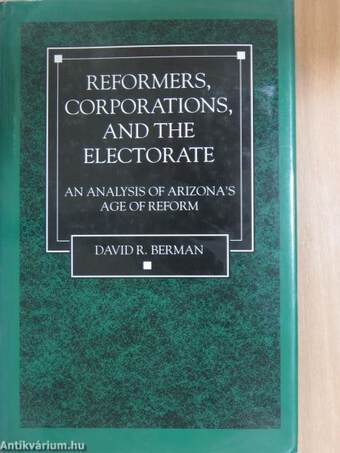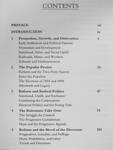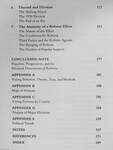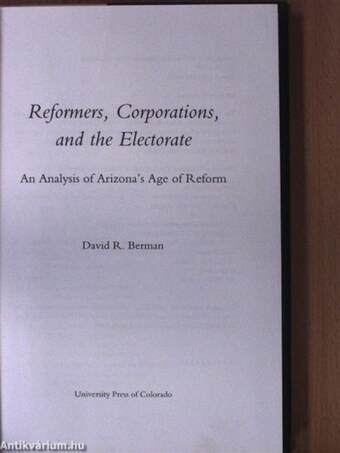1.067.327
kiadvánnyal nyújtjuk Magyarország legnagyobb antikvár könyv-kínálatát

VISSZA
A TETEJÉRE
JAVASLATOKÉszre-
vételek
Reformers, Corporations, and the Electorate
An Analysis of Arizona's Age of Reform
| Kiadó: | University Press of Colorado |
|---|---|
| Kiadás helye: | Niwot |
| Kiadás éve: | |
| Kötés típusa: | Fűzött keménykötés |
| Oldalszám: | 304 oldal |
| Sorozatcím: | |
| Kötetszám: | |
| Nyelv: | Angol |
| Méret: | 24 cm x 16 cm |
| ISBN: | 0-87081-249-1 |
naponta értesítjük a beérkező friss
kiadványokról
naponta értesítjük a beérkező friss
kiadványokról
Fülszöveg
Reformers, Corporations, and the Elec- \ torate examines the changing political manifestations of a mass^based reform movement that characterized Arizona for much of the late nineteenth and early twen-tieth centuries. It convincingly demonstrates that this movement derived from local con^ ditions, consistent abuses inflicted upon Arizonans by major railroad and mining companies, and the ability of reformers to cultivate mass discontent. Dávid Berman shows that these "corporate reformers" sought to limit Arizona's corporations through government regulation, labor legis^ lation, and tax and electoral reform.
Reformers, Corporations, and the Elec-torate delves into several causes and con-flicts that emerged both in the relatively unstudied Mountain West and nationally during the Populist'Progressive era. The frequent use of initiatives and referendums are seen as a common measure of public opinion on important issues such as suf-frage, prohibition, rail regulation, and labor... Tovább
Fülszöveg
Reformers, Corporations, and the Elec- \ torate examines the changing political manifestations of a mass^based reform movement that characterized Arizona for much of the late nineteenth and early twen-tieth centuries. It convincingly demonstrates that this movement derived from local con^ ditions, consistent abuses inflicted upon Arizonans by major railroad and mining companies, and the ability of reformers to cultivate mass discontent. Dávid Berman shows that these "corporate reformers" sought to limit Arizona's corporations through government regulation, labor legis^ lation, and tax and electoral reform.
Reformers, Corporations, and the Elec-torate delves into several causes and con-flicts that emerged both in the relatively unstudied Mountain West and nationally during the Populist'Progressive era. The frequent use of initiatives and referendums are seen as a common measure of public opinion on important issues such as suf-frage, prohibition, rail regulation, and labor protection. In the book's appendices, a detailed account of the theory, data, and methods used to examine election returns is presented, with tables showing political trends, results by counties, and analyses of election returns.
The events of Arizona's reform period interested Presidents Cleveland, Roosevelt, Taft, and Wilson, and national politicians like William Jennings Bryan and Eugene V. Debs, all of whom are part of this story. However, more prominent are Arizona figures who enjoyed national recognition but whose careers have not garnered much scholarly notice until now. Included among this group are William "Buckey" O'Neill, Populist leader who later gained fame as a Rough Rider, and Governor George W.W. Hunt, friend of labor, direct democracy, prison reform, and leader of the anticor' porate effort. Vissza
Témakörök
- Idegennyelv > Idegennyelvű könyvek > Angol > Történelem > USA története
- Történelem > Idegennyelvű > Angol
- Történelem > Politika > Belpolitika > Pártok
- Történelem > Politika > Belpolitika > Egyéb
- Történelem > Kontinensek szerint > Amerika, amerikai országok története > Észak-Amerika
- Történelem > Politika > Pártok, szervezetek
David R. Berman
David R. Berman műveinek az Antikvarium.hu-n kapható vagy előjegyezhető listáját itt tekintheti meg: David R. Berman könyvek, művekMegvásárolható példányok
Nincs megvásárolható példány
A könyv összes megrendelhető példánya elfogyott. Ha kívánja, előjegyezheti a könyvet, és amint a könyv egy újabb példánya elérhető lesz, értesítjük.








